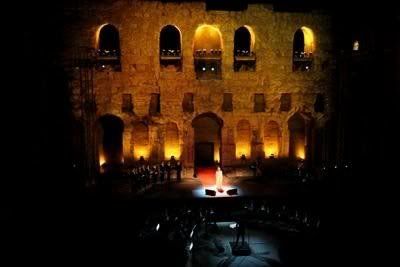I came across the following interview with the famous Lebanese singer Fairouz (pictured above). It seems it's the first she gave for 17 years and it reads as a very honest and direct expression of her thoughts about the most important things in her life:
Fairouz First Interview in 17 years.
Fairouz's last interview was in 1990 with Al Shabaka magazine. But now she speaks again in this interview with a Greek newspaper.Journalist:
Do you miss the
old Beirut?
FAIROUZ:
Of course I do, I
miss a lot.
Journalist:
What do you miss
about it?
FAIROUZ:
The peace, the
beauty -in every level-the calmness. Things that you could see everywhere
around you but don’t exist anymore. Life was pleasant, happy and full of simple
things that you can’t determine or explain, because you live them just like
your breath. You can only feel some things not describe them.
Journalist:
Why do you think
the western elements that you added in Anatolian music were so much appreciated
and accepted?
FAIROUZ:
Cause my people
are very open to all nations and all civilizations and artistic beauty have
many faces, not just one.
Journalist:
What I feel as a
Greek is a deep and intense melancholy in your voice-even in your patriotic
songs. Is it true or I just don’t understand?
FAIROUZ:
It is true, you
are absolutely right.
Journalist:
Why is that?
FAIROUZ:
The pick of
happiness is sorrow. Its something I believe deeply and it comes out when I
sing. My song doesn’t describe the beauty I was talking about before. The
country I loved exists only in my songs; it has nothing to do with the reality
I live in.
It's interesting how important prayer is to Fairouz and also how she links sorrow and happiness. How would one translate: "the pick of happiness is sorrow"? Whatever the precise meaning, it rings profoundly true. I'm surprised so few Maltese know about her as her music, the cadences, the rhythms, the words are the closest foreign analogue to traditional Maltese singing I have ever come across:
Listening to her is profoundly therapeutic to me and feels like recovering the neglected Levantine foundation of my identity. Now if only she could be persuaded to come and sing in Malta. She made her reputation singing in the Phoenician temple of Baalbeck. Imagine how beautiful a night time concert of hers in the Ggantija temples would be?


No comments:
Post a Comment